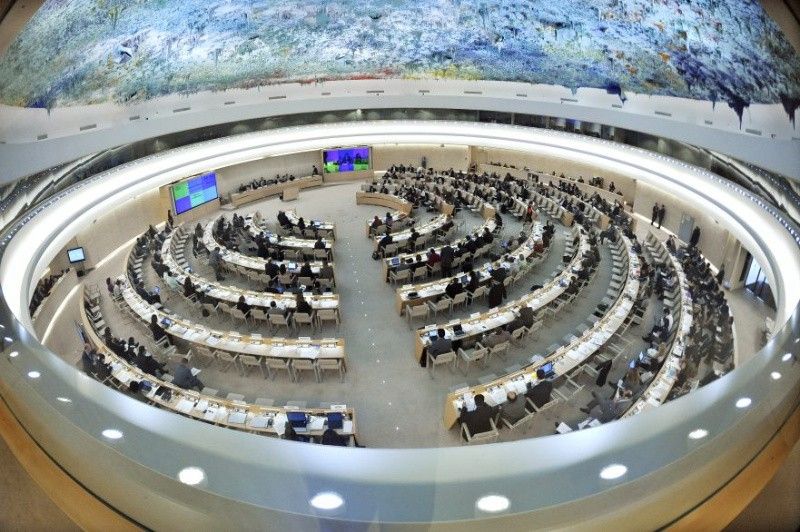The UN rights resolution on Philippines killings has been adopted—what now?

(A commentary) Last week, the UN Human Rights Council adopted a resolution expressing concern over the human rights situation in the Philippines. It specifically expressed grave concern over the killings and disappearances arising from the drug war of the current administration.
Since 2016, when the government began its campaign against illegal drugs, there have been reports of thousands of killings of people who were allegedly involved in the drug trade and drug use. Furthermore, in the recent report of Lawyers Rights Watch Canada, there have been more than 40 lawyers killed under the current administration.
The resolution was, in fact, restrained in tone and content. Human rights groups like the International Commission of Jurists had hoped that it would establish an international mechanism to investigate the killings and other human rights violations. However, the council held back and merely urged the Philippine government to “take all necessary measures to prevent extrajudicial killings and enforced disappearances." It also asked the Philippine government “to cooperate with the Office of the High Commissioner on Human Rights” and other international human rights mechanisms, and requested the UN High Commissioner for Human Rights to present a report to the Council for discussion in June 2020.
The Philippine government sent a big delegation to Geneva to lobby against the adoption of any resolution. During the informal consultations among states on this resolution, there were theatrics from the delegation, which walked out during the first consultation.
At the second consultation, nobody from the delegation attended, but former Ambassador Rosario Manalo, who also previously represented the Philippines on the ASEAN Intergovernmental Commission on Human Rights, and is now a member of the UN Committee on the Elimination of Discrimination against Women, was present. Purporting to speak as a "human rights defender," she launched an angry tirade against Iceland as the sponsor of the resolution and the other states who supported it. She also called the Filipino human rights defenders in the room who were seated right next to her as "treacherous," and accused them of peddling lies about the country.
The theatrics in Geneva did not serve the Philippine government well. In the end, the council voted to adopt the resolution.
Now that it has been adopted, what does this mean for Filipinos? The UN Human Rights Council, like any international human rights body, has significantly limited ability to directly protect human rights on the ground. Thus, while it has adopted this resolution, the council will not have the power to actually stop the unlawful killings and other human rights violations being committed. The council will be unable to compel the implementation of the recommendations in any resolution it adopts, where a state is unwilling to cooperate.
Hence, the Philippine government still holds the discretion on whether or not to implement the recommendations made by the Council.
This is where ordinary Filipinos come in. The people—as the eyes and ears on the ground—are indispensable to the work of international human rights bodies like the Human Rights Council. The effectiveness of the council in protecting human rights on the ground greatly relies upon the extent to which the people on the ground, including human rights defenders, are able to engage and work with them.
The information provided by the general public about the situation is very important to the work of international human rights mechanisms like the council. This information gives these mechanisms a clearer and more accurate picture of the human rights situation in the country.
We should thus not be silent. We should continue pressing the government to implement the recommendations in this resolution. The key recommendation is that the government should investigate extrajudicial killings and enforced disappearances and hold the perpetrators accountable. In its formal statement to the council after adoption of the resolution a few days ago, the representative of the Philippine government at the council vigorously claimed that the country has "fully functioning domestic accountability mechanisms," ignoring the fact that authorities have been unwilling or unable to conduct effective investigation or prosecutions for any of the numerous allegations of unlawful killings.
Hence, we should press the government to demonstrate that its claim that domestic accountability mechanisms are functioning is true and that it should then use these mechanisms by investigating the killings and disappearances and punishing the perpetrators.
It is a welcome development that the Human Rights Council passed this resolution on the human rights situation in the Philippines. But the work does not end there. There is a symbiotic relationship between the actions of the people on the ground and the work of international human rights mechanisms like the council. It is now left to us to press our government for the implementation of the recommendations in the resolution.
Emerlynne Gil is a Filipino lawyer and also a senior international legal adviser of the International Commission of Jurists, a global organization of judges and lawyers who work to promote and protect human rights and uphold the rule of law.
- Latest




























